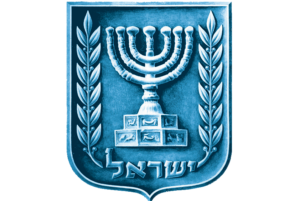| Hebrew | English |
|---|---|
רִבּוֹן הָעוֹלָם, קַבֵּל נָא בְּרַחֲמִים וּבְרָצוּן אֶת תְּפִלָּתֵנוּ לְמַעַן מְדִינַת יִשְֹרָאֵל, מֶמְשַׁלְתָּהּ וְכָל הַדָּרִים בִּגְבוּלֶיהָ וְתַחַת שְׁלִיטָתָהּ. |
Sovereign of the Universe, accept in lovingkindness and with favor our prayers for the State of Israel, her government and all who dwell within her boundaries and under her authority. |
פְּקַח נָא אֶת עֵינֵינוּ וְלִבֵּנוּ מֵחָדָשׁ לַנִּפְלָא שְׁבְּקִיּוּמָהּ וְחַזֵּק אֶת אֱמוּנָתֵנוּ בְּכֹחֲךָ לְהָבִיא גְּאוּלָה לְכָל נְשָׁמָה. |
[On the __ anniversary of her founding,] reopen our eyes and our hearts to the wonder of Israel and strengthen our faith in Your power to work redemption in every human soul. |
תֵּן לָנוּ אֶת הָאֹמֶץ וְהַהַתְמָדָה לִרְאוֹת תָּמִיד לְנֶגֶד עֵינֵינוּ אֶת הָעֶקְרוֹנוֹת שֶׁהִצִּיבָה לְעַצְמָהּ יִשְֹרָאֵל בִּמְגִילַת הָעַצְמָאוּת. הֲבֵא לְכַךְ שֶׁנִּהְיֶה שֻׁתָּפֵי אֱמֶת עִם אֶזְרְחֵי יִשְֹרָאֵל בְּהַשָֹגַת הֶחָזוֹן שֶׁטֶּרֶם נִשְׁלָם בִּמְלֹאוֹ. |
Grant us also the fortitude to keep ever before us those ideals to which Israel dedicated herself in her Declaration of Independence,[1] The Declaration of Independence of the State of Israel, 1948. so that we may be true partners with the people of Israel in working toward her as yet not fully fulfilled vision. |
תֵּן לְכָל הָעוֹסְקִים בְּצָרְכֵי צִבּוּר אֶת אֹמֶץ הַלֵּב, הַתְּבוּנָה וְהַכֹּחַ לַעֲשֹוֹת רְצוֹנְךָ בְלֵבָב שָׁלֵם. הַדְרֵךְ אוֹתָם בִּנְתִיבוֹת שָׁלוֹם וְהַעֲנֵק לָהֶם אֶת הָרְאּיָה לְהַכִּיר אֶת צֶלֶם אֱלֹהִים בְּכָל אָדָם. חַזֵּק אֶת מְגִנֵּי אֶרֶץ קָדְשֵׁנוּ וְהָגֵן עֲלֵיהֶם מִפְּנֵי אוֹיֵב, חֶרֶב סַכָּנָה וְיָגוֹן. טַע בָּהֶם עֹז לְהָגֵן עַל מוֹלַדְתָּם וְהַאֲצֵל עֲלֵיהֶם אֶת גְבוּרַת הַנֶּפֶשׁ לִכְבּוֹשׁ אֶת יֵצֶר הַשִׁלְטוֹן וְהַכֹּחַ. |
Grant those entrusted with guiding Israel’s destiny the courage, wisdom and strength to do Your Will. Guide them in the paths of peace and give them the insight to see Your Image in every human being. Be with those charged with Israel’s safety and defend them from all harm. May they have the strength to protect their country and the spiritual fortitude never to abuse the power placed in their hands. |
הֲרֵק אֶת בִּרְכָתְךָ עַל הָאָרֶץ וְעַל כָּל יוֹשְׁבֶיהָ. יִמָּצְאוּ בָהּ צֶדֶק וּזְכֻיּוֹת אָדָם לְכָל אָדָם. הַשְׁרֵש בְּלֵב כֻּלָּם אֶת מוּסַר נְבִיאֶיךָ “עֲשׂוֹת מִשְׁפָּט וְאַהֲבַת חֶסֶד וְהַצְנֵעַ לֶכֶת עִם אֱלֹהֶיךָ” (מיכה ו:ח) וְיִגַּל כַּמַּיִם מִשְׁפָּט וּצְדָקָה כְּנַחַל אֵיתָן (עמוס ה:כד) לְמַעַן יִלְמְדוּ דַרְכֵי סוֹבְלָנוּת וְכָבוֹד הֲדָדִי. יְהִי רָצוֹן שֶׁכָּל יוֹשְׁבֵי הָאָרֶץ יַכִּירוּ כִּי “לֹא בָאנוּ לְזֶה הָעוֹלָם בִּשְׁבִיל רִיב וּמַחֲלֹקֶת וְלֹא בִּשְׁבִיל שִֹנְאָה וְקִנְאָה וְקִנְטוּר וּשְׁפִיכוּת דָּמִים. רַק בָּאנוּ לָעוֹלָם כְּדֵי לְהַכִּיר אוֹתְךָ תִתְבָּרַךְ לַנֶּצַח (ר’ נתן, ליקוטי תפילות ב:נג). פְּרוֹשֹ עַל יִשְֹרָאֵל וְעַל כָּל תֵּבֵל אֶת סֻכַּת שְׁלוֹמֶךָ וְקַיֵּם בִּמְהֵרָה חֲזוֹן נְבִיאֶךָ: “לֹא יִשָּׂא גוֹי אֶל גּוֹי חֶרֶב וְלֹא יִלְמְדוּ עוֹד מִלְחָמָה” (ישעיהו ב:ד). |
Spread Your blessings over the Land. May justice and human rights abound for all her inhabitants. Guide them “To do justice, love mercy, and walk humbly with your God” (Micah 6:8), and “May justice well up like water, righteousness like a mighty stream.” (Amos 5:24); Implant tolerance and mutual respect in every heart, and may all realize that, “We were not brought into this world for conflict and dissension, nor for hatred, jealousy, harassment or bloodshed. Rather, we were brought into this world in order to recognize You, may You be blessed forever.”[2] Cf. Reb Noson of Nemyriv after the teachings of Rebbe Naḥman of Bratslav in Liqutei Tefilot Ⅱ:53. רַק יַכִּירוּ וְיֵדְעוּ כָּל יוֹשְׁבֵי תֵבֵל הָאֱמֶת לַאֲמִתּוֹ, אֲשֶׁר לֹא בָּאנוּ לְזֶה הָעוֹלָם בִּשְׁבִיל רִיב וּמַחֲלֹקֶת חַס וְשָׁלוֹם, וְלֹא בִּשְׁבִיל שִׂנְאָה וְקִנְאָה וְקִנְטוּר וּשְׁפִיכוּת דָּמִים חַס וְשָׁלוֹם, רַק בָּאנוּ לָעוֹלָם כְּדֵי לְהַכִּיר וְלָדַעַת אוֹתְךָ תִּתְבָּרַךְ לָנֶצַח (Instead, may all inhabitants of the earth recognize and know the ultimate truth: that we did not come to this world for fighting and dispute, Heaven forbid, or for hatred, jealousy, hostility and bloodshed, Heaven forbid. We came to the world only to recognize and know you, may you be blessed forever). Spread over Israel and all the world Your shelter of peace, and may the vision of Your prophet soon be fulfilled: “Nation shall not lift up sword against nation, neither shall they learn war any more.” (Isaiah 2:4) |
יְהִי רָצוֹן מִלְפָנֶיךָ שֱׁיֹאמְרוּ [במהרה בימינו] כָּל יוֹשְׁבֵי תֵבֵל “הִנֵּה טוֹב מְאֹד”, (בראשית א:לא) כִּי יִתְבָּרְכוּ בִּמְדִינַת יִשְּׁרָאֵל כָּל מִשְׁפְּחוֹת הָאֲדָמָה. |
So may it be Your Will that speedily and in our day all inhabitants of the earth will say of the State of Israel, “It is very good.” (Genesis 1:31) for she will have become a blessing to the entire world and a “Light unto the nations.” (Isaiah 42:6) |
The prayer for the State of Israel, composed May 2008/lyyar 5768 on the 60th Anniversary of the State of Israel, was first shared on the web on May 7th, 2008 here and published on paper and PDF on May 8th, 2008 in an event organized by Rabbis for Human Rights-North America, “Embracing Justice: An Alternative Celebration and Learning for Yom ha-Atzma’ut/Israel’s 60th Independence Day.”
Notes
| 1 | The Declaration of Independence of the State of Israel, 1948. |
|---|---|
| 2 | Cf. Reb Noson of Nemyriv after the teachings of Rebbe Naḥman of Bratslav in Liqutei Tefilot Ⅱ:53. רַק יַכִּירוּ וְיֵדְעוּ כָּל יוֹשְׁבֵי תֵבֵל הָאֱמֶת לַאֲמִתּוֹ, אֲשֶׁר לֹא בָּאנוּ לְזֶה הָעוֹלָם בִּשְׁבִיל רִיב וּמַחֲלֹקֶת חַס וְשָׁלוֹם, וְלֹא בִּשְׁבִיל שִׂנְאָה וְקִנְאָה וְקִנְטוּר וּשְׁפִיכוּת דָּמִים חַס וְשָׁלוֹם, רַק בָּאנוּ לָעוֹלָם כְּדֵי לְהַכִּיר וְלָדַעַת אוֹתְךָ תִּתְבָּרַךְ לָנֶצַח (Instead, may all inhabitants of the earth recognize and know the ultimate truth: that we did not come to this world for fighting and dispute, Heaven forbid, or for hatred, jealousy, hostility and bloodshed, Heaven forbid. We came to the world only to recognize and know you, may you be blessed forever). |

“תפילה למדינת ישראל | Prayer for the State of Israel, by Rabbi Arik Ascherman (2008)” is shared through the Open Siddur Project with a Creative Commons Attribution-ShareAlike 4.0 International copyleft license.










Leave a Reply